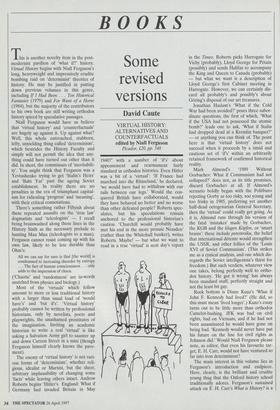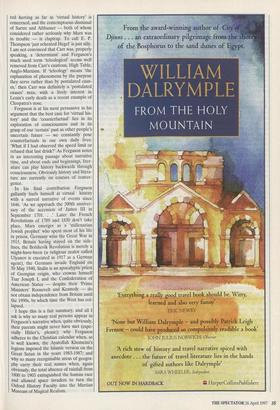BOOKS
Some revised versions
David Caute
VIRTUAL HISTORY: ALTERNATIVES AND COUNTERFACTUALS edited by Niall Ferguson Picador, f20, pp. 548 This is another novelty item in the post- modernist pavilion of 'what if?' history. Virtual History begins with Niall Ferguson's long, heavyweight and impressively erudite bombing raid on 'determinist' theories of history. He may be justified in putting down previous volumes in this genre, including If I Had Been . . . Ten Historical Fantasies (1979) and For Want of a Horse (1984), but the majority of the contributors to his own book are still writing orthodox history spiced by speculative passages.
Niall Ferguson would have us believe that 'virtual history' and 'counterfactuals' are hugely up against it. Up against what? Well, this whole entrenched, stubborn, lefty, unyielding thing called 'determinism', which bestrides the History Faculty and simply will not permit the idea that any- thing could have turned out other than it did. In short, the commissars of 'inevitabili- ty'. You might think that Ferguson was a Yevtushenko trying to get 'Stalin's Heirs' and `Babi Yar' past the ageing Soviet establishment. In reality there are no penalties in the era of triumphant capital- ism for ridiculing 'progress' and 'meaning', with their critical connotations.
There's something rather Fiftyish about these repeated assaults on the 'iron law' dogmatists and 'teleologists' — I recall being brainwashed along these lines in the History Sixth as the necessary prelude to hunting Mau Mau (teleologists to a man). Ferguson cannot resist coming up with his own law, likely to be less durable than Ohm's: All we can say for sure is that [the world] is condemned to increasing disorder by entropy ... The fact of human consciousness .. . only adds to the impression of chaos.
(`Chaotic' and 'randomness' are in-words snatched from physics and biology.) Most of the `virtuals' which follow amount to more or less traditional history with a larger than usual load of 'would have's' and 'but if s'. 'Virtual history' probably cannot be written by professional historians, only by novelists, poets and playwrights, the unashamed prostitutes of the imagination. Inviting an academic historian to write a real 'virtual' is like asking a Salvation Army girl to saunter up and down Curzon Street in a mini (though Ferguson himself clearly knows the pave- ment).
The enemy of 'virtual history' is not vari- ous forms of 'determinism', whether reli- gious, idealist or Marxist, but the sheer, arbitrary implausibility of changing some `facts' while leaving others intact. Andrew Roberts begins 'Hitler's England: What if Germany had invaded Britain in May 1940?' with a number of 'ifs' about appeasement and rearmament fairly standard in orthodox histories. Even Hitler was a bit of a 'virtual': 'If France had marched into the Rhineland,' he declared, `we would have had to withdraw with our tails between our legs.' Would the con- quered British have collaborated, would they have behaved no better and no worse than other defeated people? Roberts spec- ulates, but his speculations remain anchored to the professional historian's caution. 'Churchill would probably have met his end in the more prosaic Neasden' (rather than the Whitehall bunker), writes Roberts. Maybe! — but what we want to read in a true 'virtual' is next day's report in the Times. Roberts picks Harrogate for Vichy (probably), Lloyd George for Main (possibly) and sends Halifax to accompany the King and Queen to Canada (probably) — but what we want is a description of Lloyd George's first Cabinet meeting in Harrogate. However, we can certainly dis- card all probably's and possibly's about airing's disposal of our art treasures.
Jonathan Haslam's 'What if the Cold War had been avoided?' poses three subor- dinate questions, the first of which, 'What if the USA had not possessed the atomic bomb?' leads one to ask, 'What if Stalin had dropped dead at a Kremlin banquet?' — or anything you can think of. The point here is that 'virtual history' does not succeed when it proceeds by a timid and cautious set of 'ifs' within an arbitrarily retained framework of confirmed historical reality.
Mark Almond's '1989 Without Gorbachev: What if Communism had not collapsed?' does not, as its title promises, discard Gorbachev at all. If Almond's scenario boldly began with the Politburo rejecting Gorby as too risky, too young and too frisky in 1985, preferring yet another half-dead octogenarian General Secretary, then the 'virtual' could really get going. As it is, Almond runs through his version of the fatal 'mistakes' made by Gorbachev, the KGB and the klugen KOpfen, or 'smart brains': these include perestroika, the belief that international détente would strengthen the USSR, and other follies of the 'Louis XVI of Soviet Communism'. (This strikes me as a cynical analysis, and one which dis- regards the Soviet intelligentsia's thirst for freedom.) But such verdicts, whatever view one takes, belong perfectly well to ortho- dox history. 'He got it wrong' has always been standard stuff, perfectly straight and not the least bit gay.
Rock bottom is Diane Kunz's 'What if John F. Kennedy had lived?' (He did, so this must mean 'lived longer'.) Kunz's essay turns out to be little more than orthodox Camelot-bashing. JFK was bad on civil rights, bad on Vietnam, and if he had not been assassinated he would have gone on being bad. 'Kennedy would never have put his future on the line for civil rights as Johnson did.' Would Niall Ferguson please note, as editor, that even his favourite tar- get, E. H. Carr, would not have ventured so far into iron determinism?
The main interest in this volume lies in Ferguson's introduction and endpiece. Here, clearly, is the brilliant and erudite young thug that the Oxford history school traditionally adores. Ferguson's sustained attack on E .H. Carr's What is History? is a red herring as far as 'virtual history' is concerned, and the contemptuous dismissal of Sartre and Althusser — both of whom considered rather seriously why Marx was in trouble — is claptrap. To call E. P. Thompson 'just reheated Hegel' is just silly. I am not convinced that Carr was, properly speaking, a 'determinist' and Ferguson's much used term 'teleological' seems well removed from Carr's cautious, High Table, Anglo-Marxism. If 'teleology' means 'the explanation of phenomena by the purpose they serve rather than by postulated caus- es,' then Carr was definitely a 'postulated causes' man, with a lively interest in Lenin's early death as a recent example of Cleopatra's nose.
Ferguson is at his most persuasive in his argument that the best case for 'virtual his- tory' and the 'counterfactual' lies in its exploration of consciousness and in its grasp of our 'certain' past as other people's uncertain future — we constantly pose counterfactuals in our own daily lives: `What if I had observed the speed limit or refused that last drink?' As Ferguson notes in an interesting passage about narrative time, and about ends and beginnings, liter- ature can play history backwards through consciousness. Obviously history and litera- ture are currently on courses of conver- gence.
In his final contribution Ferguson gallantly hurls himself at virtual history with a surreal narrative of events since 1646. 'As we approach the 300th anniver- sary of the accession of James III in September 1701. . .' Later the French Revolutions of 1789 and 1830 don't take place, Marx emerges as a 'millenarian Jewish prophet' who spent most of his life in prison, Germany wins the Great War in 1915, Britain having stayed on the side- lines, the Bolshevik Revolution is merely a might-have-been (a religious zealot called Ulyanov is executed in 1917 as a German agent), the Germans invade England on 30 May 1940, Stalin is an apocalyptic priest of Georgian origin, who crowns himself Tsar Joseph I, and the Confederation of American States — despite their 'Prime Ministers' Roosevelt and Kennedy — do not obtain independence from Britain until the 1990s, by which time the West has col- lapsed.
I hope this is a fair summary, and all I ask is why so many real persons appear in Ferguson's narrative when, quite obviously, their parents might never have met (espe- cially Hitler's, please); why Ferguson adheres to the Christian calendar when, as is well known, the Ayatollah Khomeini's legions imposed the Islamic version on the Great Satan in the years 1983-1987; and why so many recognisable areas of geogra- phy carry their real names when, again obviously, the total absence of rainfall from 1800 to 1903 extinguished the human race and allowed space invaders to turn the Oxford History Faculty into the Martian Museum of Magical Realism.



































































 Previous page
Previous page